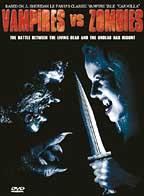| Vampires vs. Zombies | |
|---|---|
 DVD cover | |
| Directed by | Vince D'Amato |
| Written by | Sheridan Le Fanu Vince D'Amato |
| Produced by | Rob Carpenter Damien Foisy |
| Starring | Bonny Giroux C.S. Munro Maratama Carlson Brinke Stevens Peter Ruginis Melanie Crystal |
| Cinematography | Damien Foisy |
| Edited by | Vince D'Amato Nicole Hancock |
| Music by | Mikael Jacobson James Dallimore |
| Distributed by | The Asylum |
Release date |
|
Running time | 85 minutes |
| Country | United States |
| Language | English |
Vampires vs. Zombies is a 2004 American independent horror film loosely based upon J. Sheridan Le Fanu's classic 1872 novel Carmilla . Unlike Le Fanu's story, however, most of the action in the film takes place inside a car. The title and cover artwork were obviously inspired by the then-current horror film Freddy vs. Jason , [1] but the movie itself bears less resemblance to this counterpart compared to other, more blatant Asylum mockbusters. The movie was originally titled Vampires vs. Zombies, but it has since then been changed to Carmilla, the Lesbian Vampire. [2] Vince D'Amato is the director and screenwriter of this film.